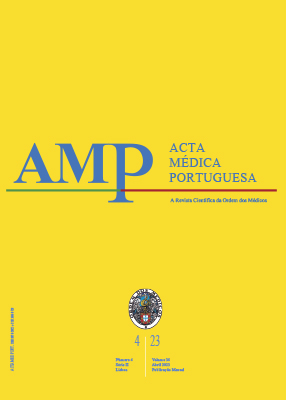Exercise Intolerance Following COVID-19: What Is the Role of Dysfunctional Breathing?
DOI:
https://doi.org/10.20344/amp.19526Keywords:
COVID-19, Exercise Test, Exercise Tolerance, Post-Acute COVID-19 Syndrome, RespirationAbstract
N/a.
Downloads
References
Naeije R, Caravita S. Phenotyping long COVID. Eur Respir J. 2021;58:2101763.
Motiejunaite J, Balagny P, Arnoult F, Mangin L, Bancal C, d’Ortho M, et al. Hyperventilation: a possible explanation for long-lasting exercise intolerance in mild COVID-19 survivors? Front Physiol. 2021;11:614590.
van Voorthuizen EL, van Helvoort HA, Peters JB, van den Heuvel MM, van den Borst B. Persistent exertional dyspnea and perceived exercise intolerance after mild COVID-19: a critical role for breathing dysregulation? Phys Ther. 2022;102:pzac105.
Frésard I, Genecand L, Altarelli M, Gex G, Vremaroiu P, Vremaroiu-Coman A, et al. Dysfunctional breathing diagnosed by cardiopulmonary exercise testing in ‘long COVID’ patients with persistent dyspnoea. BMJ Open Respir Res. 2022;9:e001126.
Freeman R, Wieling W, Axelrod FB, Benditt D, Benarroch E, Biaggioni I, et al. Consensus statement on the definition of orthostatic hypotension, neurally mediated syncope and the postural tachycardia syndrome. Clin Auton Res. 2011;21:69-72.
Downloads
Published
How to Cite
Issue
Section
License
Copyright (c) 2023 Acta Médica Portuguesa

This work is licensed under a Creative Commons Attribution-NonCommercial 4.0 International License.
All the articles published in the AMP are open access and comply with the requirements of funding agencies or academic institutions. The AMP is governed by the terms of the Creative Commons ‘Attribution – Non-Commercial Use - (CC-BY-NC)’ license, regarding the use by third parties.
It is the author’s responsibility to obtain approval for the reproduction of figures, tables, etc. from other publications.
Upon acceptance of an article for publication, the authors will be asked to complete the ICMJE “Copyright Liability and Copyright Sharing Statement “(http://www.actamedicaportuguesa.com/info/AMP-NormasPublicacao.pdf) and the “Declaration of Potential Conflicts of Interest” (http:// www.icmje.org/conflicts-of-interest). An e-mail will be sent to the corresponding author to acknowledge receipt of the manuscript.
After publication, the authors are authorised to make their articles available in repositories of their institutions of origin, as long as they always mention where they were published and according to the Creative Commons license.









